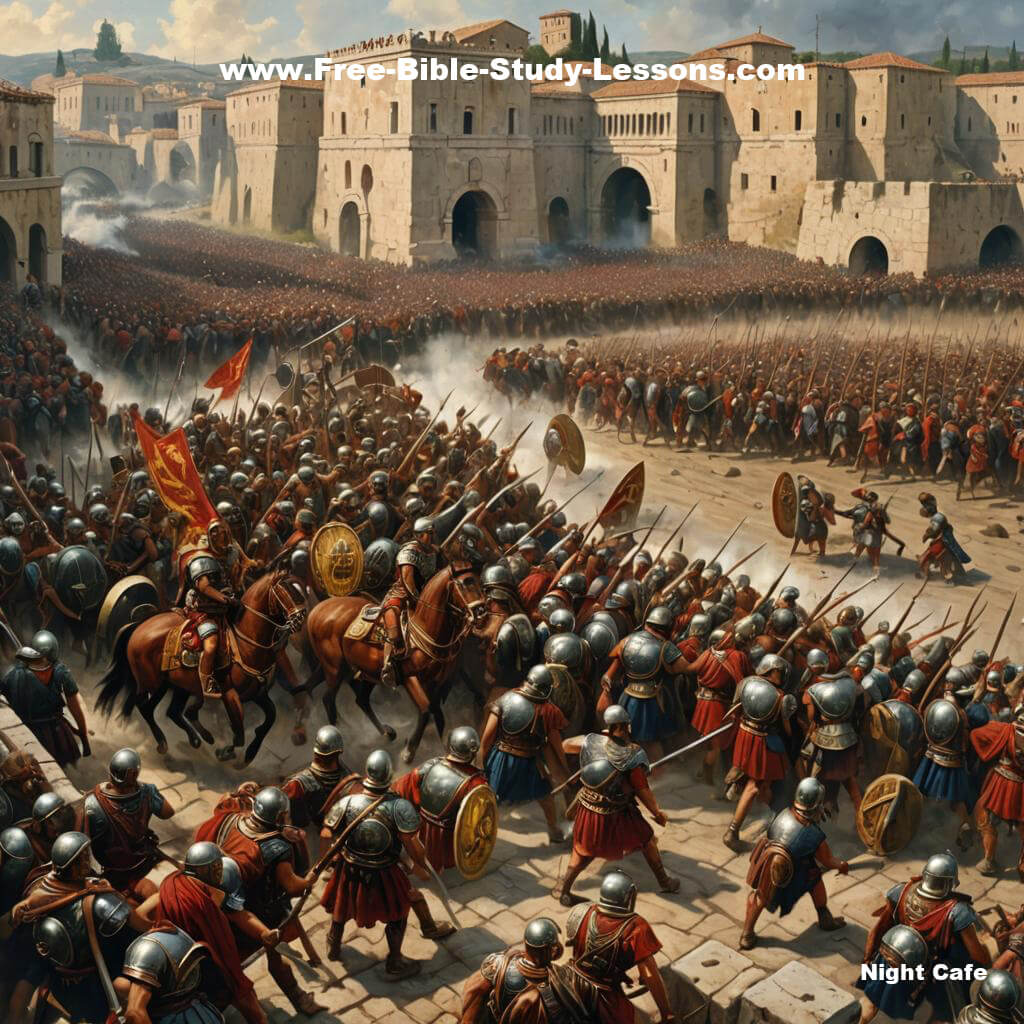| site search by freefind |
- Home
- Bible Prophecy
- Key Verse of Revelation
[If you purchase anything on this site, I may make a commission. Disclosure Policy]
Understanding The Key Verse Of Revelation
The Book of Revelation has been shrouded in mystery and debate for almost two thousand years. Men and women have struggled to untangle its strange and sometimes scary images. Self-proclaimed Bible Prophecy experts have wandered down a labyrinth followed by legions of clueless fans looking for the latest predictions to thrill or terrorize them. The hunger for sensationalism creates a black hole in the memory of these gullible adherents. Every failed prediction is sucked into this hole as they reach for their author’s next book with “updated” predictions.
Sitemap -
Newsletter -
Statement Of Faith -
Donate
Follow us on social media for daily Scripture comments and more at MeWe, Facebook or YouTube.
Yet the correct understanding of one word would clear the haze and make the path straight. This word is used 252 times in the New Testament, including 68 times in the Book of Revelation. It’s not a complicated word, but its meaning will forever change how you look at Revelation.
One of the 68 times it is used is in the key verse of revelation. We should always look for the key verse when studying a Biblical book. It is often found near the book's beginning, but it can be anywhere, including near the end. A key verse sums up the purpose of the book.
The Key Verse Of Revelation

The key verse of Revelation is Revelation 1:7. Examine it carefully, and look for the word that will shake your understanding of these prophecies…the word the experts miss because they think they know what it means. You will assume you know what it means when you read it, but look again. Here is Revelation 1:7:
"Behold, He is coming with the clouds, and every eye will see Him, even those who pierced Him; and all the tribes of the earth will mourn over Him. Even so, Amen."
Did you find it? In just a minute, I will tell you what the word is and what it means and then prove it from Scripture. Stay with me until the end. Keep an open mind. Don’t reject it because it may go against what you have always been taught. Examine the Scriptural evidence. No one overrules the Word of God.
The word is “earth.” Think you know what “earth” means? Think again. When they think of this word in the Book of Revelation, most people think of the entire world with all its inhabitants. Wrong.
The word translated as “earth” in this verse is the Greek word GE [pronounced ghay]. It can mean earth in the sense of a physical planet, as in “heaven and earth,” but most often, it refers to land, soil or a specific part of the earth, i.e. a country. When the Greeks wanted to think of the entire world and its inhabitants, they most often used the word Kosmos, which is used 187 times in the New Testament, but only 3 of those are in the Book of Revelation. A famous example of Kosmos is John 3:16.
Because this may be a revolutionary idea to you, let’s look at what Thayer’s Lexicon says GE means. The number one definition is “arable land.” The fifth definition states, "a country, land enclosed within fixed boundaries, a tract of land, territory, region; simply when it is plain from the context what land is meant, as that of the Jews." [Thayer's 114-115]. All of Thayer’s definitions emphasize GE as a physical planet, the soil, or a specific place on the planet. Respected Jewish scholar Alfred Edershiem says: "the land [earth]" in Jewish writings most often referred to the land of Israel. "Every other country was considered outside 'the land', as Palestine was called..." [Life and Times of Jesus the Messiah, 1:7]

Let’s use three Gospel examples to show how this word is used in Scripture, and then we will see how it can transform our understanding of the Book of Revelation.
After these things came Jesus and his disciples into the land [GE/earth] of Judaea; and there he tarried with them, and baptized. John 3:22, KJV
And I, if I be lifted up from the earth [GE/ground], will draw all men unto me. John 12:32, KJV
I have glorified thee on the earth [GE/land of Israel where Christ ministered]: I have finished the work which thou gavest me to do. John 17:4, KJV
These examples all come from the Gospel of John to show how John specifically uses this word, although the other Scriptural writers use it the same way.
Let’s take two examples to see how this common but misunderstood word can change our understanding of the Book of Revelation.
And there went out another horse that was red: and power was given to him that sat thereon to take peace from the earth, and that they should kill one another: and there was given unto him a great sword. Rev. 6:4, KJV
This verse is often used to teach a future global war as a Biblical prophetic fact. Honestly, it could refer to the earth as a planet with peace withdrawn. However, considering Biblical and Jewish usage of this word, it is likely referring to the land [earth] of Israel specifically. Suddenly, the first interruption is not a foregone conclusion, and we must be extremely careful of context to arrive at a correct understanding.
And the angel which I saw stand upon the sea and upon the earth lifted up his hand to heaven, Rev. 10:5, KJV
Prophetically, the “sea” often represents the restless, ungodly nations of the world. This is compared to the land [earth] of Israel. This angel’s message is for both the heathen nations and the nation of Israel.
But, some may object that maybe John did not like to use “kosmos,” and so he used “earth” as a synonym. The ultimate Author of Scripture, the Holy Spirit, would not be so imprecise. However, we know John was well acquainted with the word Kosmos. He used it 58 times in the Gospel of John and 17 times in 1 John - almost the opposite of his usage in the Book of Revelation. If John had wanted to portray a physical global conflict in the Book of Revelation, he knew how to do it, but he didn’t.
Some Christians paint a very dark future for the Jews in our day [of course, they want to be raptured out of it like rats leaving a sinking ship]. But are these dire predictions against the earth of Israel really for the future? Let’s examine our key verse again and look for time clues.
"Behold, He is coming with the clouds, and every eye will see Him, even those who pierced Him; and all the tribes of the earth will mourn over Him. Even so, Amen."
All the tribes of the earth [nation of Israel] will mourn because Jesus is coming. This does not sound like the standard “Jesus is coming to rescue the Jews” theology! All the tribes [Jews] will see Jesus come and mourn.

What else does it say? Read Scripture carefully, like a detective searching for evidence. “Even those who pierced Him”. Stop and think about that for a minute. While it was physically the Romans who pierced Christ on the cross, the Scriptures always lay the responsibility on the Jews of Jesus day. One example of this is Peter’s sermon in Acts 2:
“Therefore let all Israel be assured of this: God has made this Jesus, whom you crucified, both Lord and Messiah.” Acts 2:36, NIV
Our key verse, Revelation 1:7, which declares the purpose of the Book of Revelation, specifically states that Jews who were alive when Jesus was crucified were going to witness Jesus returning with the clouds. Revelation is not about some future catastrophe for us but a real warning about a judgment in the near future of the Jews alive when Jesus was crucified.
Six Ways Jesus Comes
Everything makes sense - except the part about Jesus returning on the clouds. How can this vital key verse talk about the Jews immediately after the crucifixion and the Return of Christ? Jesus has not yet physically returned, as all Christians correctly believe that He will. How can those who pierced Him witness His return?
Once again, the answer is found in setting our Western preconceived ideas aside and studying what the Scriptures actually teach. Scriptures reveal that there are six ways that Christ comes.
1. His Pre-Birth Coming. This is Christ appearing in the Old Testament before He was born as Jesus. He is sometimes called the Angel of the Lord.
2. His First Physical Coming. This is when Jesus was born and lived on the earth for about 33 and a half years.
3. His Kingdom Coming. Jesus told His disciples in Matthew 16:28 that they would not die until they saw Him coming in His kingdom. As far as I am aware, they are all dead now.
4. Coming In His Presence. We often speak of Jesus coming to live in our hearts or say we felt His presence in a church service. This is a coming of Jesus.
5. His Judgement Coming. Jesus comes to judge both His people and the ungodly. This is an ongoing judgment for punishment or reward on this earth before the Final Judgment. We see an example of this in Revelation chapters 2 and 3, where Jesus judges various churches, giving them either words of warning or praise.
6. His Second Physical Coming. This is when Jesus physically returns at the end of time.
Our Western preconceived ideas automatically assume that our key verse discusses the Second Coming. As we have seen, the context makes that extremely unlikely. Jesus Himself gives us the need clue when He said to the High Priest at His trial:
“I am,” said Jesus. “And you will see the Son of Man sitting at the right hand of the Mighty One and coming on the clouds of heaven.” Mark 14:62, NIV
Jesus looked the High Priest in the eye and told him he would personally witness the resurrected Christ coming on the clouds. Jesus could not have been referring to the Second Coming. Instead, He was using Old Testament prophetic language, where clouds represent the awesome presence of God, to tell the High Priest that he would witness the judgment of Jesus on the nation for rejecting and murdering the Messiah. This happened in the Jewish War of AD 66-70.

One last phrase in our key verse must be considered: “Every eye will see Him.” Again, from our Western point of view, this would appear to refer to the Second Coming, when everyone will see the Lord Jesus. However, we have seen that the context limits the “every eye” to the Jews of Jesus' day living on the earth of Israel. When we consider the context, we see how naturally this fits all we have said. Every Jew in the land of Israel experienced the horrendous judgment of God as the Romans invaded the land, slaughtering millions and enslaving the rest. Not one Jew in the land escaped this judgment. Interestingly, the Christian Jews recognized the signs given by Jesus, John and others and fled the land of Israel before the Romans invaded. Not one Christian is known to have suffered in this devastating war.
If we want to understand the Book of Revelation, we must be willing to let go of human theories and see what the Bible says in context. Our one word, “earth,” not only forces us to reexamine our interpretation of the Book of Revelation but also sheds light on many other Bible passages.
Follow us on social media for daily Scripture comments and more at MeWe, Facebook or YouTube.
Sitemap -
Newsletter -
Statement Of Faith -
Donate
Sign up for our free monthly newsletter or take one of our free Bible Study courses.
Please note: We no longer have the commenting feature [maybe again in the future]. Joshua Institute students who have questions or comments on their courses can use the contact button and mention the course name and lesson number in the email. Thank you. Glenn

Privacy - Disclosure
